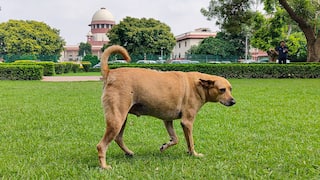Explorer
Rereading 'Heart Of Darkness' In Black History Month: Complex Legacy of Joseph Conrad's Controversial Classic
Written in 1899, “Heart of Darkness” is a morbid journey to the beginning of the time, where everything is primitive, savage, and only nature is omnipresent.

British Author Joseph Conrad.
Source : Getty
What does it mean to be a savage, primitive being in the modern times? Such questions may never come to our minds, unless you read Joseph Conrad’s masterpiece 'Heart of Darkness'. But is it a masterpiece? Nigerian novelist and essayist Chinua Achebe will beg to differ. In 1975, he condemned the novel as racist text and suggested that it be removed from the Western canon. Not only Achebe, but Edward W. Said, one of the most famous critics and author of “Orientalism”, had also raised concerns regarding the novel.
Reading Conrad, however, is a way to discover one’s own self — through protagonist Charles Marlow’s journey to meet Kurtz, the central character of the novella who embodies British colonialism. The narrative flows like a stream of river from one point to another with Beethoven’s String Quartet No 16 running in the background forcing one to ask, Must it be? To which, Beethoven whispers back: “It Must be, It Must be.”
Written in 1899, “Heart of Darkness” is a morbid journey to the beginning of the time, where everything is primitive, savage, and only nature is omnipresent. It is a tale of 'colonialism', in which Marlow, Conrad’s alter ego, travels under the Belgian trading company to Congo to retrieve the company’s lustrous representative and ivory trader, Kurtz, who has incomprehensibly gone silent. Like Captain Ahab in Melville’s “Moby Dick”, Kurtz also represents the height of a man’s ego — the great anti-hero (which Conrad tries to picture as a hero). In Africa, everyone talks about him, reveres him, envies him, and on rare occasions loathes him.
In Conrad’s depiction of the great Kurtz, one can see a reflection of the colonial master who perceives himself as a higher being, and all others as primitive. With a rifle clasped firmly, he's taken on a mantle akin to a deity or a demon, reigning over the African landscape. Conrad's portrayal of Kurtz's actions remains shrouded in ambiguity, yet a summary of "killing, seducing, plundering ivory" wouldn't stray far from the truth.
Kurtz embodies the transformation of colonialism's supposed goodness into criminality. Marlow's expedition unveils the decay and calamities of the colonial endeavor, while also symbolising a return to the primal state of nature and an introspective descent into suppressed and illicit urges. As they approach the brink of death, Marlow and Kurtz find each other.
Darkness Of The Past And Darkness Of The Future
Conrad hailed from Poland under czarist rule. Despite exposure to English in his youth, it remained his third language. His prose occasionally reveals a penchant for elaborate intellectual melodrama and poetic abstraction reminiscent of his second language, French — relentless, ineffable, unutterable! FR Leavis, the esteemed British critic and Conrad enthusiast, mocked such phrases as "the stillness of an implacable force brooding over an inscrutable intention". Leavis deemed the tone an exaggerated, overly enthralled embrace of the enigmatic.
Reading Conrad in isolation, one can reflect on his portrayal of savages (native Africans), who were colonised under the banner of Christian mission, as looking down on their reality from a Western perspective.
So, what was Marlow’s perspective?
“I don’t pretend to say that steamboat floated all the time. More than once she had to wade for a bit, with twenty cannibals splashing around and pushing. We had enlisted some of these crew. Fine fellows—cannibals—in their place. They were men one could work with, and I am grateful to them. And, after all, they did not eat each other before my face: they had brought along a provision of chaps on the way for a hippo-meat which went rotten and made the mystery of the wilderness stink in my nostrils. Phoo! I can sniff it now. I had the Manager on board and three or four pilgrims [white traders] with their staves—all complete. Sometimes we came upon a station close by the bank clinging to the skirts of the unknown, and the white men rushing out of a tumble-down hovel with great gestures of joy and surprise and welcome seemed very strange, had the appearance of being held there captive by a spell. The word ‘ivory’ would ring in the air for a while—and on we went again into the silence, along empty reaches, round the still bends, between the high walls of our winding way, reverberating in hollow claps the ponderous beat of the stern-wheel.”
The "pilgrims" have degraded into avarice and cruelty, shielded from the careful eyes of their countrymen, who continue to mask the colonial enterprise with language of Christian compassion and progress. While cannibals consuming hippo flesh exhibit self-control, Europeans do not. Thus, the essay's unsettling opening sentence reinforced this: "savagery" dwells inside all of mankind, even the most "civilised". Conrad depicted a transitory period trapped between endless millennia of darkness and the darkness that lay ahead.
In Marlow's desperate circumstance, the much-needed rivets for his failing riverboat serve as a sign of stability. In the middle of a moral upheaval, the ship, seamanship codes, and duty serve as the sole pillars that keep life together. When Marlow finally meets Kurtz, he simultaneously scorns and appreciates him, despising him for his capitulation while admiring his profound self-exploration, which leads to a personal reckoning on the verge of death.
[Disclaimer: The opinions, beliefs, and views expressed by the various authors and forum participants on this website are personal and do not reflect the opinions, beliefs, and views of ABP News Network Pvt Ltd.]
Related Video
Sambhal News : Electricity Department Investigates SP MP Ziaur Rahman Barq’s Residence Over Suspicious Meter Reading
Follow Books News on ABP Live for more latest stories and trending topics. Watch breaking news and top headlines online on ABP News LIVE TV

Capt Kaustubh Rana (Retd)
Opinion






























